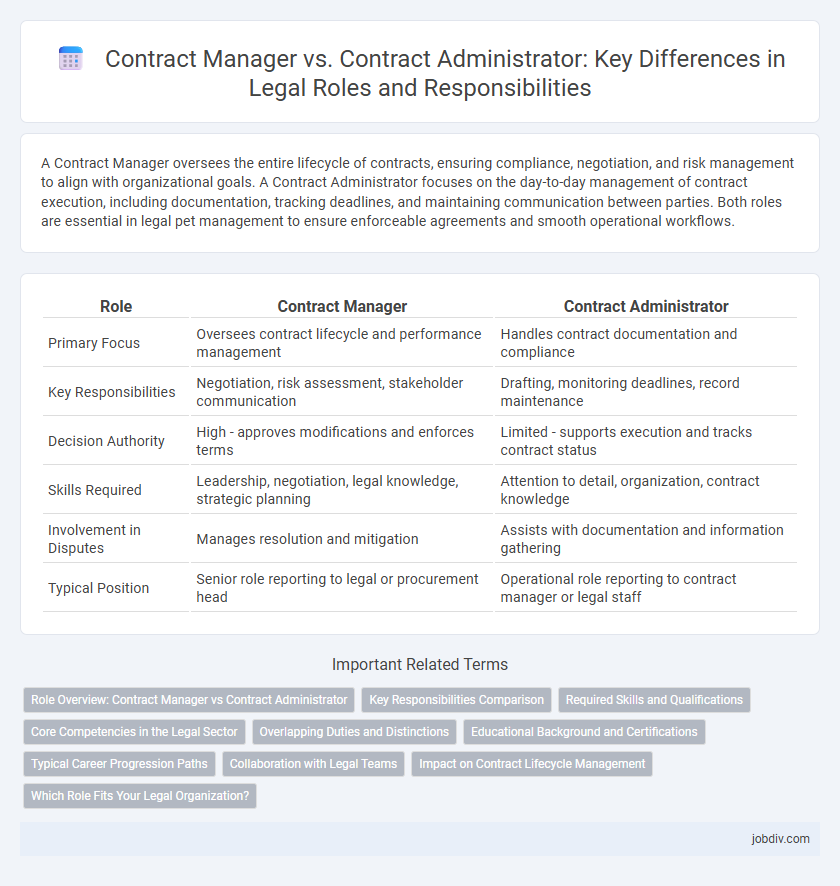A Contract Manager oversees the entire lifecycle of contracts, ensuring compliance, negotiation, and risk management to align with organizational goals. A Contract Administrator focuses on the day-to-day management of contract execution, including documentation, tracking deadlines, and maintaining communication between parties. Both roles are essential in legal pet management to ensure enforceable agreements and smooth operational workflows.
Table of Comparison
| Role | Contract Manager | Contract Administrator |
|---|---|---|
| Primary Focus | Oversees contract lifecycle and performance management | Handles contract documentation and compliance |
| Key Responsibilities | Negotiation, risk assessment, stakeholder communication | Drafting, monitoring deadlines, record maintenance |
| Decision Authority | High - approves modifications and enforces terms | Limited - supports execution and tracks contract status |
| Skills Required | Leadership, negotiation, legal knowledge, strategic planning | Attention to detail, organization, contract knowledge |
| Involvement in Disputes | Manages resolution and mitigation | Assists with documentation and information gathering |
| Typical Position | Senior role reporting to legal or procurement head | Operational role reporting to contract manager or legal staff |
Role Overview: Contract Manager vs Contract Administrator
A Contract Manager oversees the entire contract lifecycle, ensuring compliance, negotiation, and risk management, while a Contract Administrator focuses on the detailed execution, documentation, and communication aspects of contracts. Contract Managers develop strategic agreements and manage relationships with stakeholders, whereas Contract Administrators handle day-to-day administrative tasks such as tracking deadlines, maintaining records, and facilitating contract renewals. The Contract Manager's role involves higher-level decision-making, whereas the Contract Administrator supports operational efficiency and contract accuracy.
Key Responsibilities Comparison
Contract Managers oversee the entire contract lifecycle, including negotiation, execution, compliance monitoring, risk management, and stakeholder communication, ensuring contractual obligations align with business objectives. Contract Administrators focus on maintaining contract records, tracking deadlines, processing amendments, and facilitating internal coordination to ensure contract terms are adhered to. Both roles require contractual knowledge but differ in scope, with Contract Managers emphasizing strategic oversight and Contract Administrators concentrating on operational execution.
Required Skills and Qualifications
Contract Managers require advanced negotiation skills, strong legal knowledge, and project management expertise to oversee contract creation and compliance effectively. Contract Administrators need attention to detail, proficiency in contract documentation, and the ability to manage contract lifecycles and ensure adherence to terms. Both roles benefit from strong communication abilities and familiarity with contract law, but Contract Managers often hold certifications like CPCM or PMP, while Contract Administrators may require specialized training in contract administration software.
Core Competencies in the Legal Sector
Contract Managers in the legal sector excel in negotiation, risk management, and strategic oversight, ensuring compliance with contractual obligations and mitigating legal risks. Contract Administrators focus on detailed contract documentation, tracking deliverables, and maintaining records to support legal audits and dispute resolution. Both roles require strong knowledge of contract law, attention to detail, and proficient communication skills to facilitate effective contract lifecycle management.
Overlapping Duties and Distinctions
Contract Managers and Contract Administrators both oversee contractual processes, but Contract Managers focus on strategic negotiation, risk management, and compliance throughout the contract lifecycle, while Contract Administrators handle documentation, record-keeping, and day-to-day contract execution. Overlapping duties include monitoring contract performance, ensuring obligations are met, and facilitating communication between stakeholders. Distinctions lie in the Contract Manager's broader responsibility for contract strategy and decision-making, contrasting with the Contract Administrator's detailed management of contract terms and administrative tasks.
Educational Background and Certifications
Contract Managers typically hold a bachelor's degree in business administration, law, or supply chain management, with many pursuing advanced certifications such as Certified Commercial Contract Manager (CCCM) or Project Management Professional (PMP) to enhance their expertise. Contract Administrators often have a background in legal studies, paralegal programs, or business, supplemented by certifications like Certified Contract Administrator (CCA) or National Contract Management Association (NCMA) credentials. Both roles require a solid understanding of contract law and negotiation principles, but Contract Managers focus more on strategic and financial aspects, while Contract Administrators emphasize compliance and documentation.
Typical Career Progression Paths
Contract Managers typically advance into roles such as Senior Contract Manager or Legal Compliance Officer, leveraging extensive experience in drafting and negotiating complex agreements. Contract Administrators often evolve into Contract Coordinators or Project Managers, focusing on ensuring contract execution and operational compliance. Both paths may converge towards strategic roles like Procurement Manager or Risk Manager, emphasizing broader responsibilities in contract lifecycle and organizational governance.
Collaboration with Legal Teams
Contract Managers collaborate closely with legal teams to negotiate contract terms, ensuring compliance with regulatory requirements and minimizing risks. Contract Administrators support legal teams by managing contract documentation, tracking obligations, and facilitating communication between stakeholders to maintain contract integrity. Effective collaboration between Contract Managers and Administrators with legal teams enhances contract enforceability and reduces potential disputes.
Impact on Contract Lifecycle Management
Contract Managers drive the strategic planning and execution of contract lifecycle management, ensuring alignment with business objectives and risk mitigation. Contract Administrators focus on the operational aspects, such as maintaining contract records, compliance tracking, and facilitating communication between parties. Their combined roles optimize contract performance, reduce administrative errors, and enhance decision-making throughout the contract lifecycle.
Which Role Fits Your Legal Organization?
Contract Managers oversee the entire contract lifecycle, focusing on negotiation, compliance, and risk management to ensure strategic alignment with organizational goals. Contract Administrators handle day-to-day contract execution, maintaining records, monitoring deadlines, and facilitating communication between parties to ensure smooth operational flow. Legal organizations seeking a strategic approach to contractual relationships benefit from Contract Managers, while those needing detailed contract administration and process management may find Contract Administrators more suitable.
Contract Manager vs Contract Administrator Infographic

 jobdiv.com
jobdiv.com